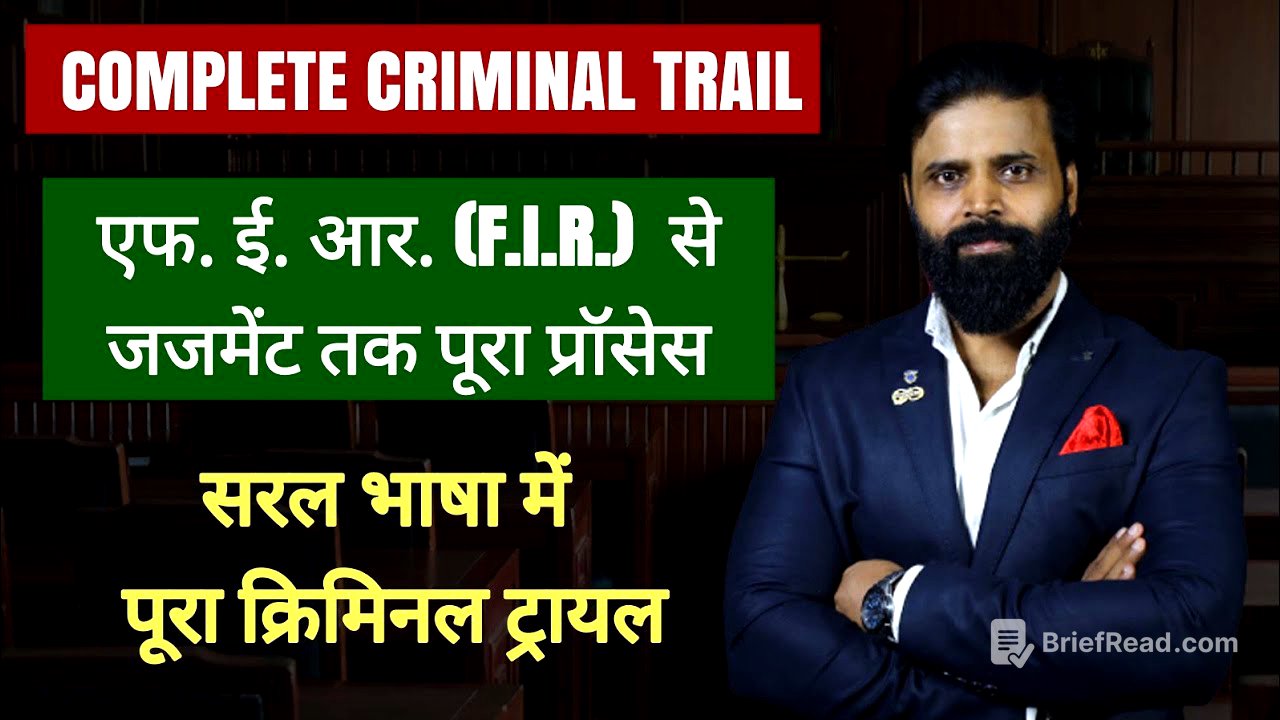TLDR;
This video explains the step-by-step procedure of a criminal trial in court, starting from the initial complaint to the final judgment. It covers key stages such as filing a complaint, police investigation, arrest, bail, plea bargaining, summary trial, warrant trial, recording of evidence, and final arguments. The aim is to inform individuals facing criminal trials about the process and their rights.
- Filing a complaint and police investigation under CrPC sections.
- Bail application process and types of bail.
- Court trial stages: plea bargaining, summary trial, and warrant trial.
- Recording of evidence and final arguments.
Filing a Complaint and Police Investigation (Section 154 CrPC) [0:41]
When a criminal offense occurs, the affected person files a complaint at the police station. This complaint is registered under Section 154 of the Criminal Procedure Code (CrPC). The police then investigate the complaint to determine if an arrest is necessary. If the police don't investigate, the complaint can be judged under 156 3 in the court. Non-cognizable reports fall under Section 155(2). If an arrest is required, the arrested individual must be presented before a magistrate within 24 hours, as per Section 57 CrPC.
Bail Application Process (Sections 437 & 439 CrPC) [2:10]
After an arrest, the arrested person can apply for bail. There are two types of bail: regular bail, which can be applied for before a magistrate under Section 437 CrPC, or before a session court under Section 439 CrPC. The decision on whether to grant bail depends on the court's discretion. The police will continue to investigate the case and submit a final report under Section 173 CrPC. If the police investigation finds no evidence against the accused, they can file a closure report under Section 169 CrPC along with Section 173 CrPC, concluding the case.
Plea Bargaining (Section 265 CrPC) [3:55]
If the police investigation finds evidence against the accused, the process of plea bargaining can begin. Plea bargaining involves the accused admitting their mistake and applying to the court for a reduced punishment under Section 265 CrPC. If the plea bargaining application is successful, the court may reduce the punishment. If it fails, or if no plea bargaining application is filed, the court proceeds with the trial.
Summary Trial vs. Warrant Trial [5:13]
When the final report is presented to the court, the court determines whether to conduct a summary trial or a warrant trial, based on the nature of the case. In a summary trial, the court decides on the substance of the accusation under Section 251 CrPC. In a warrant trial, charges are framed under Section 240 CrPC, specifying the offenses for which the trial will be conducted.
Conviction and Recording of Evidence [6:07]
During a summary trial, if the accused admits their offense, the court can convict them under Sections 252 and 253 CrPC. If the accused does not admit the offense, evidence is taken, starting with the prosecution's evidence under Section 254 CrPC. The prosecution presents evidence, followed by cross-examination, then the defense presents evidence, followed by cross-examination. In a warrant trial, prosecution evidence is recorded under Sections 274 and 275.
Statement Under Section 313 and Final Arguments [7:23]
In both summary and warrant trials, a statement is recorded under Section 313 CrPC, where the accused explains their perspective on the offense. After all evidence is recorded, final arguments are presented by both the defense and prosecution advocates. Finally, the court passes its judgment, under Section 255 in a summary trial and under Section 248 in a warrant trial.









